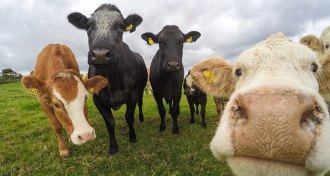
Meghan Rosen is a senior writer who reports on the life sciences for Science News. She earned a Ph.D. in biochemistry and molecular biology with an emphasis in biotechnology from the University of California, Davis. Her dissertation work involved studying mutated proteins in liver and kidney cancer. She later graduated from the science communication program at UC Santa Cruz. Prior to joining Science News in 2022, she was a media relations manager at the Howard Hughes Medical Institute. Her work has appeared in Wired, Science, and The Washington Post, among other outlets. Once for McSweeney’s, she wrote about her kids’ habit of handing her trash, a story that still makes her (and them) laugh.

Trustworthy journalism comes at a price.
Scientists and journalists share a core belief in questioning, observing and verifying to reach the truth. Science News reports on crucial research and discovery across science disciplines. We need your financial support to make it happen – every contribution makes a difference.
All Stories by Meghan Rosen
-
 Health & Medicine
Health & MedicineHaving sex doesn’t trigger heart attacks, study suggests
Sex doesn’t trigger heart attacks, study of patients with cardiovascular disease suggests.
-
 Health & Medicine
Health & MedicineBalloons-and-glue device seals remote wounds inside the body
To repair damaged tissue, surgeons can deliver a glue patch using two balloons and a blast of UV light.
-
 Life
LifeGia Voeltz: Redrawing the cell’s floor plan
Cell biologist Gia Voeltz has changed our view of the endoplasmic reticulum.
-
 Particle Physics
Particle PhysicsMap captures Earth’s antineutrino glow
Tiny subatomic particles called antineutrinos stream away from Earth at different concentrations across the globe, a new map illustrates.
-
 Health & Medicine
Health & MedicineStudy finds benefits from lowering blood pressure, but questions remain
Preliminary results from NIH clinical trial suggest that lower blood pressure is better, but scientists have not yet published the data and open questions remain.
-
 Health & Medicine
Health & MedicineClinical trial suggests new blood pressure standard
Preliminary results from a clinical trial suggest lower blood pressure targets could reduce rates of cardiovascular diseasae.
-
 Life
LifeHumans adjust walking style for energy efficiency
Humans can adjust their steps to walk in a way that uses the least amount of energy.
-
 Paleontology
PaleontologyEarliest sea scorpion discovered in Iowa
Earliest sea scorpion discovered in impact crater in Iowa.
-
 Health & Medicine
Health & MedicineHow farm life can prevent allergies
Farm dust prevents allergies by turning on an anti-inflammatory enzyme in the cells lining mice’s lungs.
-
 Health & Medicine
Health & MedicineMicrobes make the meal, new diet book proposes
Researcher Tim Spector skewers conventional thinking about weight loss in ‘The Diet Myth’
-
 Chemistry
ChemistryWanted: Crime-solving bacteria and body odor
Forensic investigators are moving past old-school sleuthing to analyze microbes and odors that tell a more complete story, while pursuing ways to enhance traditional tools as well.
-
 Animals
AnimalsTwin pandas look forward to growth spurts
The surviving panda twin born at the National Zoo last weekend will undergo DNA tests to discover paternity.